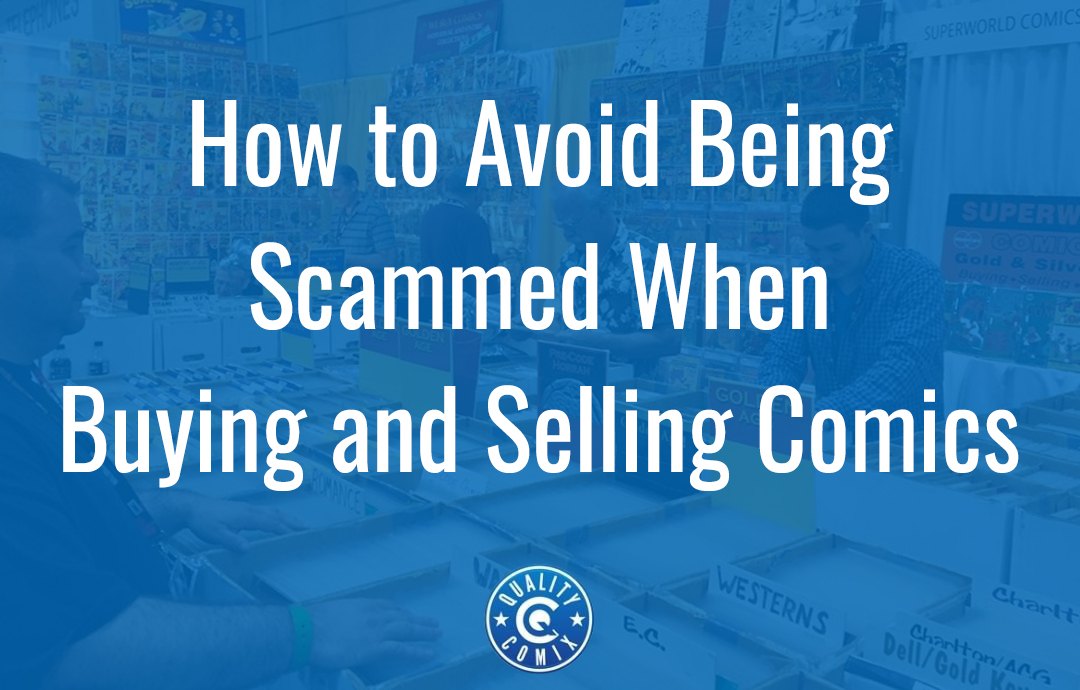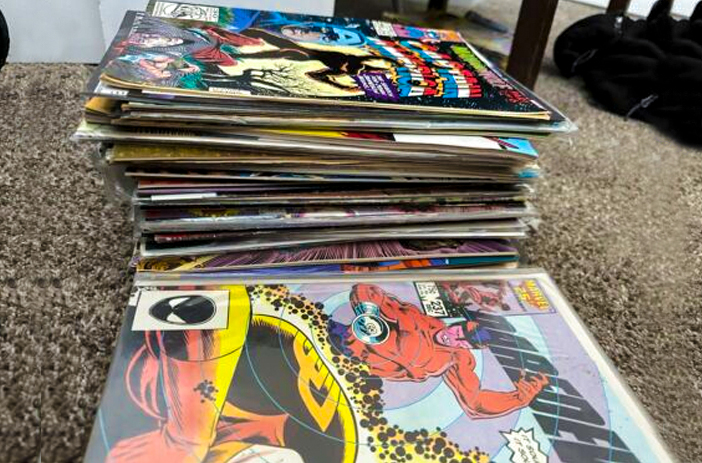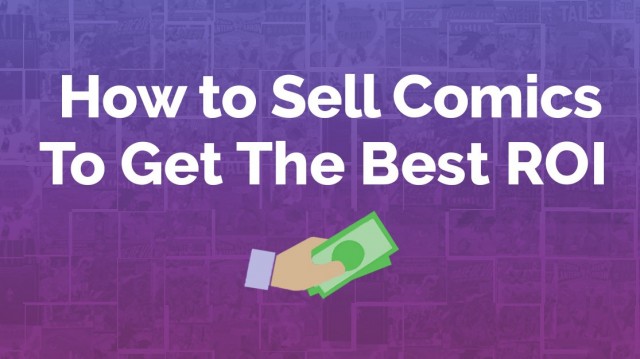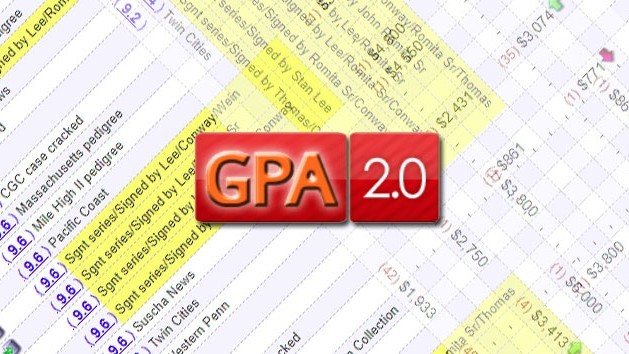
Any time you're buying or selling something, you have to be vigilant against scammers and con artists. There are people, both online and in person, who have no problem trying to pull the wool over your eyes to get a better deal for themselves. Avoiding those people can be tricky, and a big part of it involves knowing what kinds of scams can show up.
Above all, the best tip we can give is to always be willing to walk away. No matter what a potential buyer or seller has to say, if you feel like the situation is sketchy or they're trying to pull a fast one, you can hit the bricks and walk away. Worst case scenario, you find out you were wrong, reach back out, and try again; best case, you avoid being scammed and can find a legitimate buyer or seller instead.
So, what scams are out there, what should you watch for, and how can you protect yourself? Let's dig in.
Table of Contents
Common Scams in Comic Sales
First, let's go over some of the more common scams in comic sales, so you know what might happen and how to avoid them.
Selling a Stolen Collection
This, or some variation of it, comes up occasionally when you're trying to buy bulk collections. If you're a seller, you won't encounter it; if you're a buyer, you'll only encounter it if you're buying large groups of comics.
What happens is someone will claim they have a collection to sell on behalf of someone else, usually someone who died. They'll claim not to know the value of the comics and collection, and they'll usually want to be paid in cash or with a non-reversible money order. The collection may or may not be noteworthy or valuable, but they will push for as much money as they can get out of it. By the time you discover that you've bought a stolen collection, the seller is long gone with money you can't recover.

Image source: Google Images
One way to protect yourself is to ask for documentation that they're authorized to sell the estate. Generally, you want to do business using a payment method that can be reversed if the deal turns sour.
"The Fees are Too Dang High!"
A common gripe with online marketplaces and payment processors is that the fees they charge are just too dang high. Sellers and buyers on eBay both have this gripe, as does anyone who uses PayPal. There are a lot of different ways to get around it, but you generally want to avoid them.
On eBay, for example, if you bid on or wishlist an item, the seller might reach out and complain about the fees, asking for an alternative deal. On other marketplaces, they might not want to use PayPal, or they'll want to use "friends and family" processing rather than Goods and Services.

All of these have one thing in common: the payment methods they prefer are non-reversible. See where we're going with this? Once the scammer gets their money, they cut and run, and you never see the merchandise you paid for. Since there's no protection – because you went outside of the established process – there's nothing you can do.
Fees exist for a reason. While a big part of that reason is the enrichment of the platform, some of it is protection for buyers and sellers. Sure, they chafe, but if you ever need that protection, it sucks not to have it and be left high and dry.
Just Plain Theft
When selling in person, it's generally a good idea to meet in a public place, or, even better, a place with cameras and possibly even law enforcement present. A common location for online sales to take place in person is a police department's lobby or parking lot, and in fact, some departments even have a designated place and process specifically for the facilitation of an exchange.

It's a gigantic red flag if a buyer or seller wants to meet in an isolated location or a location away from the watchful eye of security. Maybe they have friends, and maybe those friends have weapons. Maybe they just want to "sit in the comfort of their car" and see the comics in hand, whereupon they drive off. Theft is theft – it's not really a scam – but it's still your loss and their gain.
Relatedly, there are all sorts of common scams that aren't unique to comics. Always ask to inspect the items you're considering buying before handing over the money, avoid common check scams, and be aware of the warning signs of fraud online.
Buyer Beware
Another scam you see occasionally is that a seller will misrepresent what they have. Online listings can have pictures of a comic in better condition than the one that arrives. A seller might claim to have an important variant or a complete version of a book that is usually missing a centerfold, only for you to find out it doesn't or isn't. There are also simply fraudulent replicas, particularly of rarer indie comics like TMNT (though TMNT is a unique case where the counterfeits have their own role in the story and their own value… if they're the right counterfeits.)

Do your due diligence. Use a reverse image search on the photos used in a listing and make sure they're unique. Make sure to know what the grading scale says and what you're going to be getting. Go through the platform and be ready to file a claim if the item arrives in a misrepresented condition. It's a hassle and a lot of hoops to jump through, but it's better than being stuck with goods that are much worse in condition or perhaps not even what you ordered.
Bad Prices and Low Offers Aren't Scams
One thing to mention here is that an off-kilter price doesn't necessarily mean someone is trying to scam you. Some people have a high bar for the value of their collectibles, often factoring in a personal attachment or nostalgia to them that you don't share. A seller wanting to sell their comic for super high prices doesn't mean they're scamming you, just that they don't really want to part with the comics. Alternatively, they're looking at sale listings and not sold listings, or they're misidentifying variants they have or reprints they don't know are reprints. It's not always malicious!

Likewise, if you're selling comics and you get lowball offers, are they really lowballs? Remember that vendors, flippers, and stores are never going to offer actual retail prices. Instead, they'll offer somewhere between 40-60% of the value of the books because they need room for their own profits. They don't have much incentive to buy at the same price they'd sell for, after all!
Tips for Protecting Yourself from Scams
Now let's get into some more general ways you can protect yourself from scams, both as a buyer and as a seller.
First, understand the process. If you haven't bought or sold comics before, consider talking to the folks at your local comic shop to ask about how they buy and sell and what warning signs to watch out for or people locally to avoid. Even if they aren't the ones buying or selling, they'll probably be willing to help.
Understanding the common process is critical for then knowing what is outside the norm and when to walk away. No matter how convincing the reasoning why the scammer wants to go outside the norm, you don't want to fall for it.
Next, ask questions and get specifics. As a buyer, you want to be able to ask for things like photos, details about the comics, and other specifics. If a seller doesn't want to provide them or can't, beware.
If you're shipping comics, get tracking, insurance, and potentially even delivery confirmation. A common online scam is to just claim they never received the item and request a refund from the platform. Signature confirmation can prove otherwise.

Another common ploy is the bait and switch. This can happen to buyers when the seller has a book they list, but the one they give you is a less valuable variant or is in worse condition than it should be. For sellers, the buyer might try to change the shipping address, payment method, or price at the last minute in a way that leaves you vulnerable. Stick to the terms of the original deal, and always inspect merchandise when you get a chance, especially if you can prior to making the trade.
In general, it's also a good idea to avoid classified marketplaces. As much as we occasionally recommend venues like Facebook Marketplace or Craigslist as venues to sell comics, it's usually much better to either go to eBay or sell to a comic marketplace instead. Facebook and Craigslist, in particular, are both full of scammers on the prowl, and while they can be viable venues, they're also fraught with danger.
Avoid sketchy payment options. Whether you're the buyer or the seller, it doesn't matter; avoid any non-standard payment options. Consider the recourse if either the money or the product is fake; what can you do? If a check bounces, you may be out of luck. If cash is counterfeit, same deal. If someone wants to go through PayPal's friends and family money-sending option, well, you lose any buyer or seller protection the platform offers that way.
If you're trying to sell a full collection, you may also want to avoid letting a buyer pick through it. Looking through it is fine! But, if they go through, pull out a dozen comics to buy, and only want to buy those, there's a decent chance they're picking out the valuable comics and leaving you with dollar-bin books you'll struggle to sell afterward. If you're aware of that and you're fine parting out the collection, then by all means, make the deal if the offer is fair; otherwise, know that you'll be left with much less value than you had.
Finally, to reiterate what we said above, never be afraid to walk away. If anything smells off about the deal, call the whole thing off and find a different buyer or seller. Maybe you lose a good opportunity, but much more likely, you lose a bad time. This goes double if the person on the other end of the deal gets mad, tries to berate you about wasted time and about a great deal you'll never get again, or anything of the like. They're putting on the pressure to try to make you reconsider, and that's a sure sign to get out.
Avoid the Hassle and Deal with Reputable Vendors
Private deals happen all the time, and if that's the route you want to go, so be it. For many of you, though, you can save a lot of time, hassle, and risk by dealing with reputable businesses instead of trying to do it yourself via eBay or the like.
Obviously, we're going to recommend ourselves here. If you're in the market to buy, we sell a wide array of graded and high-end comics, and you can browse our listings at any time. On the other hand, if you want to sell your comics, you can reach out and talk to us directly. We offer no-cost, no-obligation appraisals for collections, and you're under no pressure to accept any offer we make. We know you may just be looking for information, and that's fine! We're comics fans helping other comic fans.

There are other companies out there with good reputations you can buy from or sell to as well. Regardless of what you choose, it's always going to be a more pleasant experience than dealing with the minefield of scammers on big-name marketplaces and direct listing sites.
If you have questions, want advice, need an appraisal, or just want to talk about your collection and what you can do with it, drop us a line! We love to help out in any way we can.



